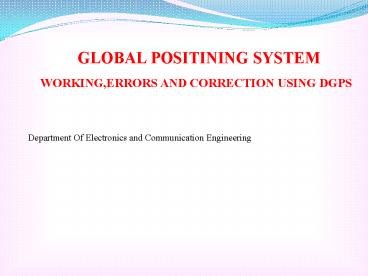GLOBAL POSITINING SYSTEM - PowerPoint PPT Presentation
Title:
GLOBAL POSITINING SYSTEM
Description:
GLOBAL POSITINING SYSTEM WORKING,ERRORS AND CORRECTION USING DGPS Department Of Electronics and Communication Engineering * * * * * * * * OBJECTIVE: To overcome the ... – PowerPoint PPT presentation
Number of Views:79
Avg rating:3.0/5.0
Title: GLOBAL POSITINING SYSTEM
1
GLOBAL POSITINING SYSTEM
WORKING,ERRORS AND CORRECTION USING DGPS
Department Of Electronics and Communication
Engineering
2
- OBJECTIVE
- To overcome the drawbacks in Global positioning
system by implementing Differential global
positioning system .
3
- INTRODUCTION
- The Global Positioning System (GPS) is a
satellite-based Navigation system developed and
operated by the US Department of Defense. - GPS Permits land, sea and airborne users to
determine their three-dimensional position and
time. - This service is available to military and
civilian users around the clock, in all weather,
anywhere in the world.
4
- GPS ELEMENTS
- GPS has 3 parts.
- The space segment consists of 24 satellites, each
in its own orbit 11,000 nautical miles above the
Earth. - The user segment consists of receivers, which you
can hold in your hand or mount in your car. - The control segment consists of ground stations
(five of them, located around the world) that
make sure the satellites are working properly.
5
Figure representing the elements of GPS
6
- WORKING OF GPS
- The principle behind GPS is the measurement of
distance ( "range") between the receiver and the
satellites. - The satellites also tell us exactly where they
are in their orbits above the Earth - Four satellites are required to compute the four
dimensions of X, Y, Z (position) and Time - GPS receivers are used for navigation,
positioning, time, and other research.
7
A Person using Gps in mountains
GPS device which is used for navigation
A Car consisting Gps to show route maps
A Person using Gps to find route in forest
8
- SOURCES OF GPS SIGNAL ERRORS
- Factors that can degrade the GPS signal and thus
affect accuracy include the following - Ionosphere and troposphere delays the satellite
signal slows as it passes through the atmosphere.
The GPS system uses a built-in model that
calculates an average amount of delay to
partially correct for this type of error. - Signal multi path This occurs when the GPS
signal is reflected off objects such as tall
buildings or large rock surfaces before it
reaches the receiver. This increases the travel
time of the signal, thereby causing errors.
9
- Number of satellites visible the more
satellites a GPS receiver can "see," the better
the accuracy. Buildings, terrain, electronic
interference, or sometimes even dense fog can
block signal reception, causing position errors
or possibly no position reading at all.
10
- Implementing DGPS
- The three main methods currently used for
ensuring data accuracy are - real-time differential correction,
- reprocessing real-time data,
- post processing.
- i.Real-Time DGPS Correction
- Real-time DGPS occurs when the base
station calculates and broadcasts corrections for
each satellite as it receives the data. The
correction is received by the receiver.
11
ii. Reprocessing Real-Time Data GPS manufacturers
provide software that can correct GPS data that
was collected in real time. If a satellite
collecting data can be low on the horizon that it
provides only a weak signal, which causes spikes
in the data. Reprocessing real-time data removes
these spikes and allows real-time data that has
been used in the field for navigation
iii. Post processing Correction
Differentially correcting GPS data by post
processing uses a base GPS receiver that logs
positions at a known location and a rover GPS
receiver that collects positions in the field.
The files from the base and rover are transferred
to the office processing software, which computes
corrected positions for the rover's file.
12
LIMITATIONS OF GPS GPS can provide
worldwide, three-dimensional positions, 24 hours
a day, in any type of weather. However, the
system does have some limitations. There must be
a relatively clear "line of sight" between the
GPS antenna and four or more satellites.
Objects, such as buildings, overpasses, and
other obstructions, that shield the antenna from
a satellite can potentially weaken a satellite's
signal such that it becomes too difficult to
ensure reliable positioning. These difficulties
are particularly common in urban areas. The GPS
signal may bounce off nearby objects causing
another problem called multipath interference.
13
- APPLICATIONS OF GPS
- GPS receivers were used in several aircraft,
including F-16 fighters and B-2 bombers - GPS has become important for nearly all
military operations and weapons systems . - GPS is also helping to save lives. Many police,
fire, and emergency medical service units are
using GPS receivers to determine the police car,
fire truck, or ambulance nearest to an emergency,
enabling the quickest possible response in
life-or-death situations.
14
- Automobile manufacturers are offering moving-map
displays guided by GPS receivers and also
demonstrating GPS-equipped vehicles that give
directions to drivers on display screens and
through synthesized voice instructions. - Mapping and surveying companies use GPS
extensively. - GPS-equipped balloons are monitoring holes in the
ozone layer over the Polar Regions, and air
quality is being monitored using GPS receivers.
15
CONCLUSION GPS a satellite based navigation
system, thus can be used to determine the
position of an object on earth. As discussed
above, its application field is vast and new
applications will continue to be created as the
technology evolves.
16
REFERENCES SatelliteCommunication-T.PrattandC.W
.Bostain-John Wiley and Sons. www.iec.org www.sss
-mag.com
17
ANY QUERIS
18
Thank you































